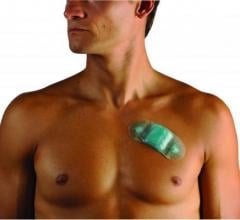June 24, 2009 – Data presented today as a Hot Line session at the EUROPACE 2009 congress on the XPECT clinical trial, sponsored by Medtronic Inc., shows that the Medtronic Reveal XT Insertable Cardiac Monitor (ICM) reliably identifies patients with AF (sensitivity of 96.1 percent) and correctly confirms the absence of AF in patients (negative predictive value of 97.4 percent).
Current methods for detecting AF, such as Holter monitors and 24-hour event monitors, have limited effectiveness, even if performed repeatedly, given the transitory nature of the monitoring, the company said. XPECT (Reveal XT Performance Trial), involving 247 patients at 20 sites, was conducted to quantify the accuracy of continuous monitoring, achieved via the Reveal XT Insertable Cardiac Monitor, for detecting and documenting AF through continuous monitoring.
Professor Gerhard Hindricks of the Heart Center at the Universitätsklinikum in Leipzig, Germany, serves as principal investigator for the XPECT trial and presented today’s data. “The XPECT results show that continuous monitoring by the Reveal XT device enables reliable detection of AF with high sensitivity and specificity, along with accurate recordings of AF episode duration,” Hindricks said. “Additionally, this trial demonstrated that the Reveal device correctly rules out AF in patients who do not have significant AF burden. Continuous monitoring can be an essential tool for physicians to successfully manage AF or subsequently take action to prevent negative outcomes such as stroke resulting from AF. Physicians can best optimize the use of antiarrhythmic and anticoagulation medicines only if they can precisely and correctly diagnose a patient’s atrial fibrillation.”
Placed just under the skin of the chest area in a short outpatient procedure, the Reveal XT device provides up to three years of continuous heart rhythm monitoring. Reveal XT captures and stores an electrocardiogram (ECG) automatically, according to physician-programmed settings. An additional option to store an ECG is having the patient place a hand-held, pager-sized assistant over the device and pressing a button. Later, a physician analyzes the stored information, which can be transmitted remotely via the Medtronic CareLink Network or viewed during an in-office patient visit. Clinical data available to the physician includes views of individually stored ECG episodes, or longer-term trended diagnostic data via Reveal XT’s Cardiac Compass Report, including daily AF burden, patient activity and average day and night heart rates. Additionally, Medtronic Reveal devices are labeled for use in MRI machines, meaning patients with a device implanted may safely undergo MRI scans under certain conditions.
For more information: www.medtronic.com


 March 31, 2025
March 31, 2025 





